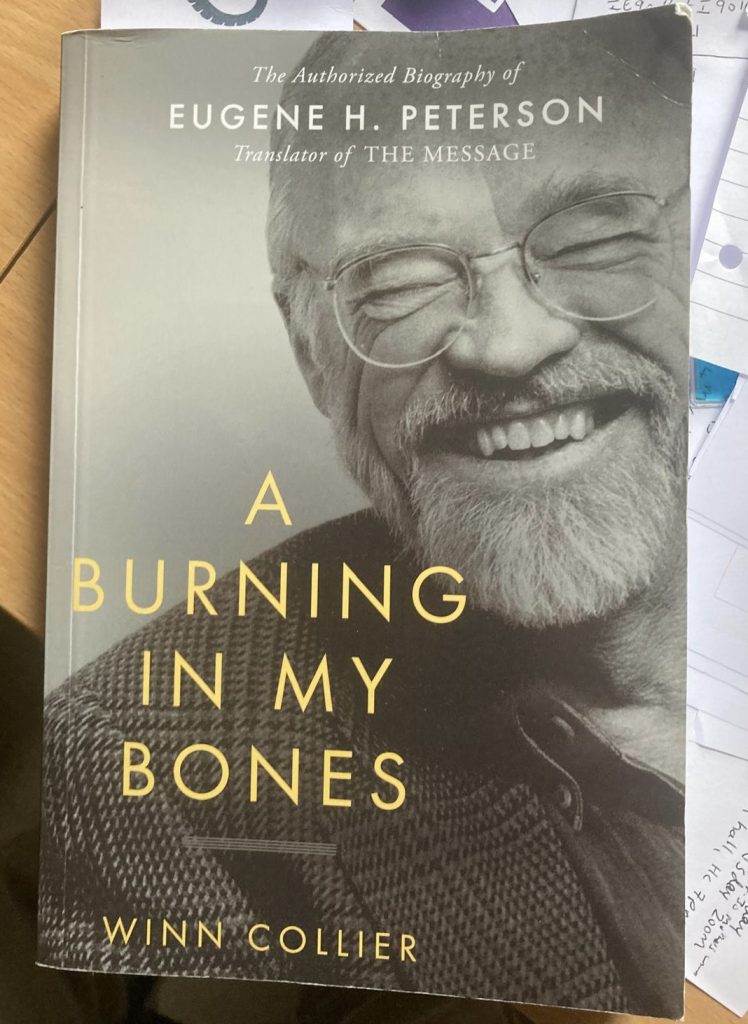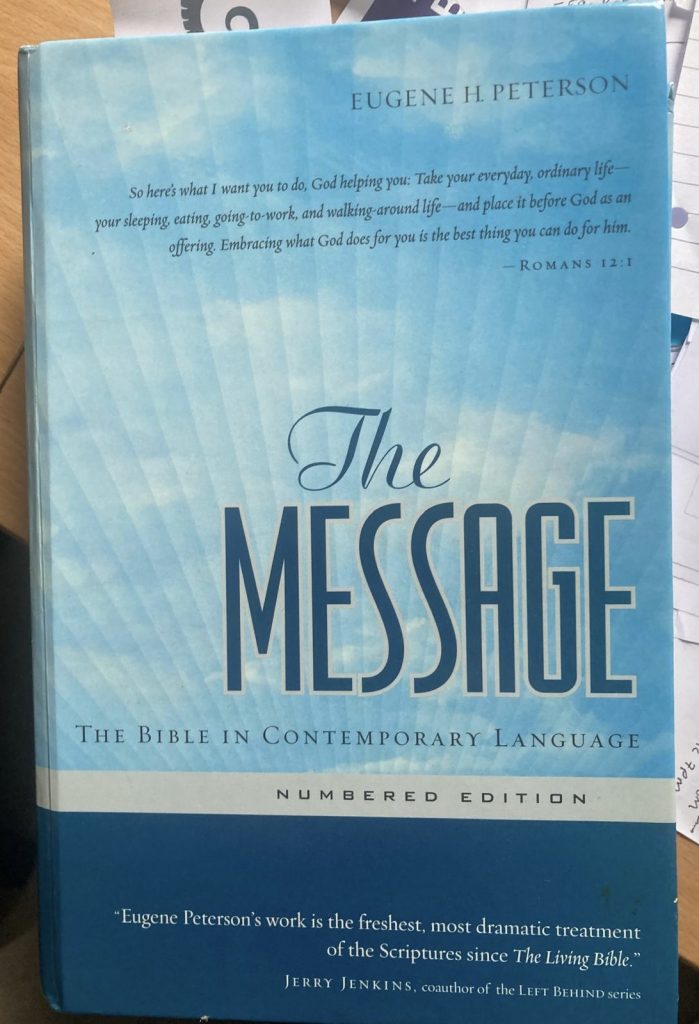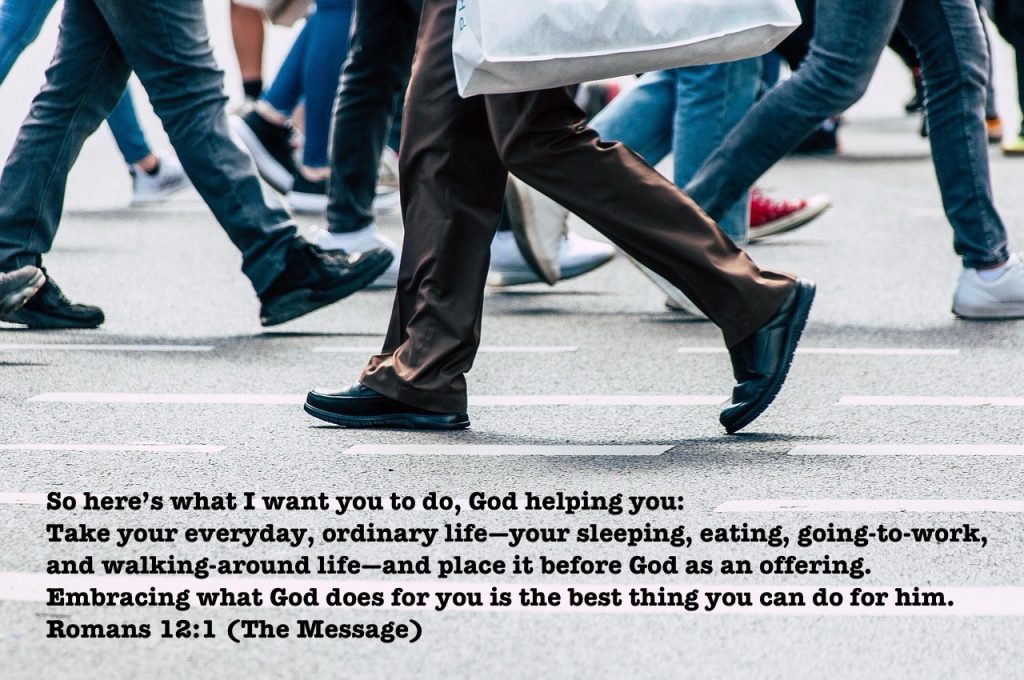A Window into Someone’s World
I’ve always enjoyed memoirs, autobiographies and biographies. Some of them are more revealing than others and they can give us a real insight into someone else’s world, what makes them tick and how they have built their career or navigated some of the challenges they have faced.
We tend to have a fascination with the lives of those who are in the public eye, whether they are politicians, musicians, sportspeople or perhaps actors or entertainers.

I have almost finished a wonderful biography of the pastor and writer, Eugene Peterson, called ‘ A Burning in my Bones’. It’s a book I have had on my shelf for some time, but only just got around to reading.
Eugene Peterson spent many years working as a pastor in Mayland in the United States. He spent some years teaching at a university in Vancouver, Canada. He wrote a number of books, perhaps the most famous being his translation of the Bible into contemporary language, which is called ‘The Message’ and has sold millions of copies around the world.

On all sorts of levels, his story is a very ordinary one. He grew up in Montana, the son of Norwegian immigrants. He was no stranger to hard work, helping in his father’s butcher’s shop. He was skilled with his hands as a builder and joiner and, in his youth, was a very competitive athlete excelling in track and field and athletics.
His mum was a very devout woman and came from a Pentecostal background and, as he grew up, he was immersed in the Bible and its stories and language. As faith became more and more important to him, he learned the Biblical languages of Greek and Hebrew and pursued God’s call on his life, concluding that he was called to be a pastor.
Perhaps because this aspect of his journey is close to my own heart, I loved the way the book invited us into this journey. We get a picture of someone who was quiet and contemplative, but who had a deep desire to live God’s way and be holy. It wasn’t a holiness, however, that distanced itself from the world around him, and he longed to learn more about the culture and the different world views and thought systems that people held.
The book is very candid about some of his failures, the struggles he had with maintaining a good work/life balance, and some of the interpersonal struggles he had as he tried to plant a church and grow a congregation.
The biographer gained access to his journals and Eugene was keen to share some of his personal struggles and convictions that drove him in the work that he did.
We get insights into his devotional life and his prayer life and the things he wrestled with as he wrote his books. He was keen to bridge that gap between theology and faith and the rough and tumble of everyday life .
He viewed marriage and family life as a vitally important part of his journey to personal holiness, and was very honest in confessing to his failings and, at times, his lack of availability to both his wife and children. At times, these things led to huge turmoil and internal anguish.
As someone who became renowned or famous as a writer in the second half of his life, we get a sense of how much of himself he poured into the writing of his books. He agonised about fame as a distraction from what was his primary goal, to point others to Jesus. The Message, his most famous work, took many years to complete as he sought to make the Bible accessible to ordinary American people and use the language they would use. Any translation is likely to attract some criticism and his certainly did, but his translation was based upon reading the texts in Hebrew and Greek and trying to allow them to speak for themselves.
As a pastor, which was his primary calling, we get a sense of just how much he cared about people’s souls and what lengths he was prepared to go to in order to encourage, challenge and direct people on the spiritual path. It didn’t always win him friends, but people recognised his integrity and intentionality and what an impact his ministry had on a huge number of people.
We can tell a lot, too, about the way people reflect on their own mortality, and the things that are important in life are brought into sharp focus when a serious illness is diagnosed. There are some very tender and honest descriptions of how Eugene processed these things in the final chapters of the book.
Although he was quite a private person, there is a sense in which he knew that his story might be helpful for others to engage with as they reflected on their own spiritual journey. It was only with the prompting of others that he deeply respected, that he considered cooperating with this project. Once he decided, however, he was all in.
I wonder what level we would want people to see inside our soul? Would we be comfortable with people knowing about what we were really like, sharing our devotional life and spiritual practices? Would we be comfortable if much of it was extremely ordinary, nothing fancy, just spending time with your people, reading the Bible, praying and journalling. Eugene’s life speaks in the title of one of his books of a long obedience in the same direction.

Can I ask you to hold in your prayers the Girvan family circle on the death of Frank. Frank’s funeral service will be in the church on Friday, October 17th at 11am.
Look forward to speaking again soon.
Much love to everyone,
Jono.
Listen to the latest episode of ‘Bitesize Chunks of Faith’


